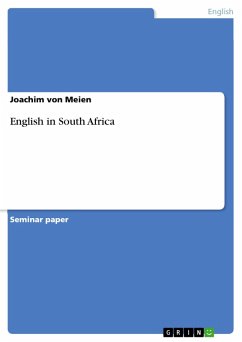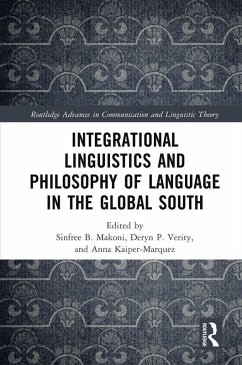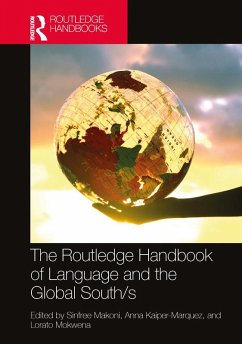
The politics of English in South Africa (eBook, PDF)
Versandkostenfrei!
Sofort per Download lieferbar
Statt: 17,95 €**
13,99 €
inkl. MwSt. und vom Verlag festgesetzt.
**Preis der gedruckten Ausgabe (Broschiertes Buch)
Alle Infos zum eBook verschenkenWeitere Ausgaben:

PAYBACK Punkte
0 °P sammeln!
Seminar paper from the year 2008 in the subject English Language and Literature Studies - Culture and Applied Geography, grade: 2,0, Humboldt-University of Berlin (Department of English and American Studies), course: The Politics of English as a Global Language, language: English, abstract: Before one can start discussing the language policy of South Africa, it is important to stress its diversity of language and culture groups. Around 25 languages are used in South Africa by more than 44.8 million people. That is the result of the influx of various groups of people to that region over the las...
Seminar paper from the year 2008 in the subject English Language and Literature Studies - Culture and Applied Geography, grade: 2,0, Humboldt-University of Berlin (Department of English and American Studies), course: The Politics of English as a Global Language, language: English, abstract: Before one can start discussing the language policy of South Africa, it is important to stress its diversity of language and culture groups. Around 25 languages are used in South Africa by more than 44.8 million people. That is the result of the influx of various groups of people to that region over the last centuries, meaning not only the by the African themselves, but also by people from Europe (Portuguese, Dutch, French, Germans, and British) and also from the East (Malaysia, Indonesia and India). Nevertheless, the majority of South Africans, almost 80% of the population, use an African language as their home language. The language situation in South Africa hasfor a long time been, and still is, quite difficult. Here, the indigenous languages of the South African people met with the European languages of the colonists, intermixed and coexisted with the many languages that were already spoken as mother tongues or as first languages. Like in many other former colonies, the European languages had then been used by those who held political power, and who considered the African languages as inferior. Both the European (English and Afrikaans) and the African languages were therefore distinguished into two varieties of prestige and referred to as H (high) or L (low) languages. [...] However, until today, the linguistic situation in South Africa is still quite difficult. Especially the use of English is a problematic one. Therefore this paper intends to give an overview of the politics of English in South Africa. Even though this paper wants to concentrate on the current status of English in South Africa, it is necessary to make a digression into the language policy of the country first, and to explain its varieties to British English. Moreover, it is important to allude to the history of the use of the English language in South Africa, in order to fully understand why it is so controversially debated, and why English is seen as a bearer of hope for many black people on the one hand, but has failed to fulfil these dreams on the other.
Dieser Download kann aus rechtlichen Gründen nur mit Rechnungsadresse in A, B, BG, CY, CZ, D, DK, EW, E, FIN, F, GR, HR, H, IRL, I, LT, L, LR, M, NL, PL, P, R, S, SLO, SK ausgeliefert werden.













